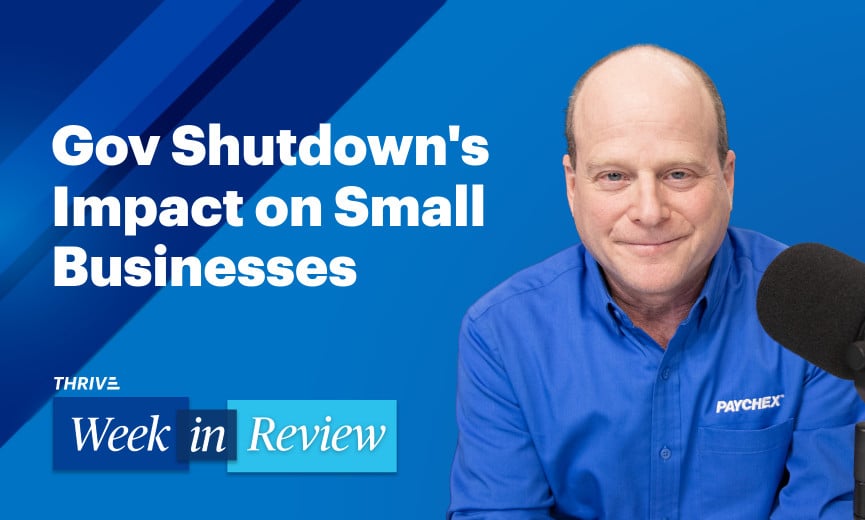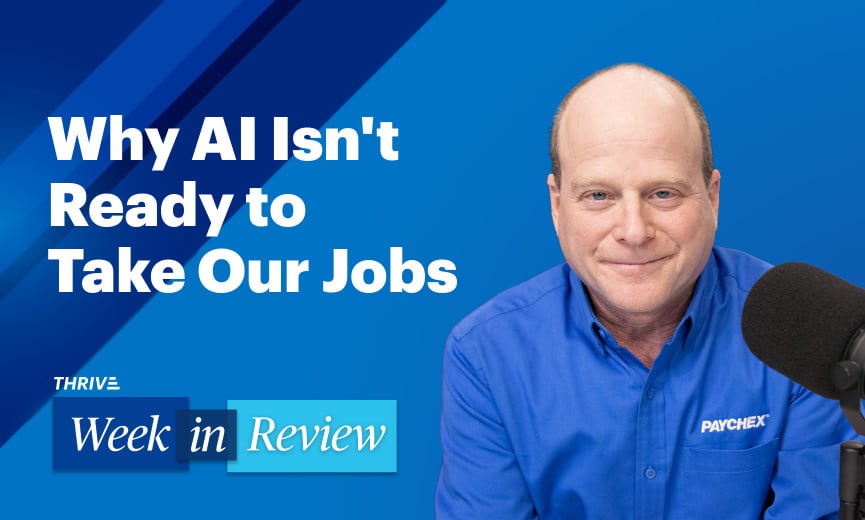- Thrive
-
Season
4Episode178
Wage Growth Near Inflation Rate, Business Acquisitions up 25%, and the Cost of Shoplifting
Podcast •
Watch
Summary
The Paychex Small Business Employment Watch has shown seven months of modest gains for wages and businesses showing resilience amid a tight labor market. Gene Marks shares insights on what this means when inflation is factored in. Plus, a look at the red-hot acquisitions market shows a spike in prices, especially in the service and manufacturing sectors. Gene talks about the trend continuing for a few years. The sale of retail operations is slowing, but factoring in shoplifting increasing 24% so far in 2024, that makes sense. Gene tells us what this could mean in costs for your business.
View Transcript
Hey, everybody, it’s Gene Marks and welcome to this week's episode of the Paychex THRIVE Week in Review podcast. This is where we take a few items of news that happened during this past week that impacts you and me as people running and managing businesses. So, let's get to it, shall we?
The first item of news comes from Paychex itself. The monthly Small Business Employment Watch has been released, and I want to share with you some information about it. Shall we? So, according to the Small Business Employment Watch, hourly earnings growth for U.S. workers in businesses with fewer than 50 employees has held steady since May. Reporting about 3.16% growth in July, and weekly earnings growth remains below 3% for the sixth consecutive month.
Now remember, guys, inflation is anywhere from 3 to 4%. So, when I see earnings growth on an annualized basis of 3.16% or even lower than that, that concerns me, right? The Small Business Jobs Index from Paychex has reported moderate gains on average through the first seven months of 2024.
Let's see what John Gibson, Paychex’s CEO, has to say about this. “Overall,” he says, “small businesses are looking to hire, but continue to face a tight labor market. Inflationary pressures and an evolving regulatory environment are making it difficult for these organizations to compete for scarce, qualified employees. While job growth is moderating compared to last year, small businesses continue to be resilient and are finding ways to navigate the changing economic environment.”
What else does John Gibson say? He says that the hiring dynamics by region, state, and industry are diverging, with the strongest job growth happening in the Midwest, and a notable slowdown in construction hiring across the country. Small businesses are also continuing to carefully manage hours worked, which remains negative year over year for the 16th straight month.
So just some takeaways here, okay? Number one, wages – both hourly and weekly earnings – are around 3%, even a little bit less for weekly earnings. That's not great when you compare ourselves to an inflation rate of anywhere from 3 to 4%. So, we have to be, we have to be concerned about that. Jobs are still moderate gains on average. People are still hiring, although, you know, businesses are facing some real challenges, both inflationary and regulatory. Construction industry jobs have seen a notable slowdown. So, that is something that we definitely want to keep an eye on.
But, overall, according to Gibson from Paychex, small businesses are navigating their way through this environment and continue to show resilience. So, takeaway is the job market. it's okay. You know, unemployment is low. It's still very competitive. We'd like to see wages rise a little bit only because it will help our workers keep up with inflation and put less pressure on us as employers.
Alright, let's move to the next bit of news. This comes from a company called BizBuySell – B-I-Z B-U-Y S-E-L-L. Every quarter, they the issue their insight report; what they do is they're a platform that helps and educates businesses that are looking to sell or buy their businesses, right?
So, let's talk about what's going on in the resale or sales market because I think it's very interesting for us that are potentially looking for an exit. So, for starters, the acquisitions of small businesses have risen to a multi-year high. Sale prices are up 25%.
In the service sector, if you were running a service business, the price of businesses being sold have jumped 17% over the year. Manufacturing businesses: The price to sell your business has increased 31% over the year. The retail sector is showing slowdown in selling. Forty-two percent of buyers say their performance is most important, followed by growth and location. Fifty-three percent of business owners say that the election will have an impact on their business for sure.
Let me dig into this just a little bit more, okay? Small business acquisitions reached a familiar milestone., BizBuySell reports, in the second quarter after growing in the prior quarters, as well. They said that over about 2,500 businesses were reported as sold in their database, during the second quarter, representing a value of $1.9 billion. It's 20% higher than the same time last year.
After falling 13% in 2022 amid rising interest rates and red-hot inflation, transaction volumes made a strong rebound and now matches 2019’s pre-pandemic levels. However, at the same time, demand has pushed the median sale price of businesses up 25% year over year. The average business they surveyed sold for about $375,000 – I mean, these are very small businesses – as buyers continue to focus on businesses with strong financial performance. The median revenue of businesses that were sold have grown 4% year over year, as well.
So, what is the takeaway from this report. It's this: A lot more businesses are being sold, we're at pre-pandemic levels, and sales prices themselves have increased significantly over the year even though businesses have been dealing with regulations and inflation. That's tempered a bit. And I think we're seeing demographics play a part, guys. I mean, we have a much older demographic of people running businesses in this country. People are trying to make their exit on their way out.
I think we've got Millennials that are coming up that have been working in companies for a while now looking to start their own businesses. Some smarter ones are buying existing businesses rather than start something from scratch. Interest rates are going to have an impact, and, in fact, one of the things say that 24% of the business owners that they surveyed were waiting for interest rates to come down before making a purchase.
So, all of this activity we're seeing, all this increase in sales and increase in sales price. I mean, when interest rates go down, they're expecting to see even more. So, it's a hot market for selling your business or buying an existing business, as well. I expect that to continue for quite a few years.
Finally, and not great news another report that just came out has shown that the rate of shoplifting at retailers has reached a staggering level. This is according to a report from the Council on Criminal Justice. Shoplifting increased 24% in the first half of 2024. They say in many cases shoplifting is seen as a crime of necessity for low-income Americans.
As inflation continues to impact both businesses and families, shoplifting rates have surged even higher within the group of shoplifters Some patterns just to be, that you should be aware of: Americans with children younger than 18 – 27% of them – and Millennials were among the most likely to commit the shoplifting crime, indicating they might be facing more financial worries than any other groups.
There is some considerations, given the type of store a shoplifter will attack. Roughly half of them said they would go for a chain store, but 28% of the shoplifters – whoever answered the survey – said they would target a local store, as well.
So, shoplifting continuing to be a problem. How is that going to impact your business if you're in retail? Well, obviously the cost of security is going to go up. You need to be investing in technology. There are some really great new AI applications and platforms coming on the market that will help better track people – do facial recognition, license plate recognition. You know, you might have to hire security guards, put things behind a protective glass to make sure they don't get lifted.
All of this is more of a cost to your business and what that's ultimately going to mean is more of a cost to your customers because you're going to be passing those costs on, aren't you? That's what business people do.
So, shoplifting a big issue. Continues to rise. I think that's going to impact all of you guys running retail businesses. You need to be preparing for it, investing in it, you know, ways to reduce this. And listen, I think that's going to ultimately show up in costs.
My name is Gene Marks. You have been watching or and listening to the Paychex THRIVE Week in Review. Thank you so much for joining me. If you have any questions, if you want advice, tips from prior episodes of this podcast, sign up for Paychex THRIVE newsletter. Go to paychex.com/thrive.
Again, thanks so much for watching or listening. We'll see you again next week with some more news that impacts your business. Take care.
This podcast is property of Paychex, Incorporated, 2024. All rights reserved.

 Apple Podcast
Apple Podcast Spotify
Spotify iHeartRadio
iHeartRadio









